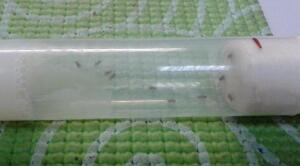por
Gus Iversen, Editor in Chief | August 25, 2015

Drosophila (fruit flies)
at the MIPT laboratory
Credit: Svetlana Zhikrivetskaya
Exposing fruit flies to gamma radiation may sound cruel, but new research suggests that in very weak doses — it can actually make them live longer. Scientists at the Moscow Institute of Physics and Technology in Russia think their findings could ultimately inform increased human longevity and perhaps someday "prevent aging" altogether.
Their research challenges the widely held notion that any amount of radiation is a hazardous amount of radiation, an assumption that has come under fire before due to its
linear no-threshold logic.
Their research is based on the premise of hormesis; a biological phenomenon whereby a beneficial effect results from exposure to low doses of an agent that is toxic or lethal when given at higher doses.
Previous studies have shown small doses of poison can benefit yeast cells, peppermint, and roundworm, said the researchers. By using radiation to activate the "stress genes" and "stress paths" of fruit flies, they hope to isolate the mechanisms that push an organism to excel and survive.
"It is suggested that hormesis is universal, that its mechanism of operation, the stress genes and stress paths, are very similar to those of wounded animals. We are looking for these common paths and are compiling a list of the relevant genes. It is possible to do this more quickly, simply and cheaply using flies rather than mice and other animals," said Svetlana Zhikrivetskaya, lead author, in a statement.
Zhikrivetskaya's team has researched roughly 2,000 fruit flies so far, (half male, half female) and divided them into four sub-groups which received different doses of radiation, ranging from .05 grays to .4 grays. They compared the life span of those sub-groups to a control set of 2,000 untreated flies.
Unlike people, flies are known to handle radiation well, so the risk of overexposure is diminished and it is perhaps easier to gauge the benefits of smaller doses. It may also stand to reason that a dose to increase human longevity would be smaller than the dose to increase that of a fly.
"The results of our experiment have demonstrated that life expectancy of the drosophila (fruit fly) grows," said Zhikrivetskaya. "Furthermore, the effect is significantly stronger in the female: for females life expectancy was extended by 7.6 percent, whilst for males it grew by just 3.4 percent."
While the average fruit fly lives about two months, the low dose exposure increased lifespan by about one week, she said.
Next up, the researchers hope to experiment on radiation hormesis in mice, with the ultimate goal of figuring out exactly which genes are involved in increasing an organisms lifespan, and finding ways to safely activate them in humans.
The results were published in the journal
PLOS ONE.
